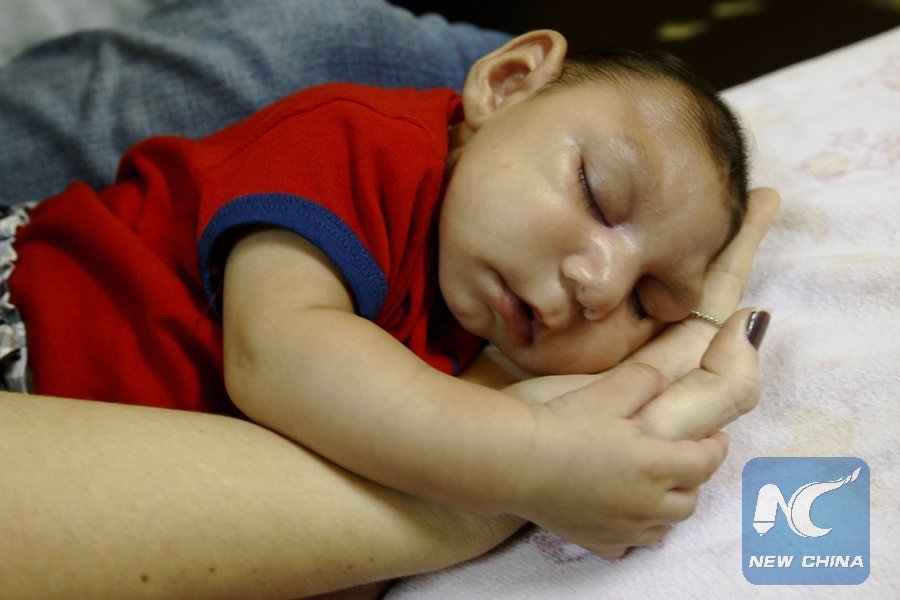
Luiz Philipe, who was born with microcephaly, sleeps in his house in Marica, Rio de Janeiro state, Brazil, on March 9, 2016. (Xinhua/Estefan Radovicz/Agencia o Dia/AGENCIA ESTADO)
WASHINGTON, Jan. 31 (Xinhua) -- Relatives of the Zika virus, especially West Nile, can spread from an infected pregnant mouse to her fetuses, causing brain damage and fetal death, researchers said Wednesday.
The findings, published in the U.S. journal Science Translational Medicine, suggested that Zika may not be unique in its ability to cause birth defects, such as microcephaly, or abnormally small heads.
"We only studied mice and human tissues, so we can't say for sure what happens when pregnant women are infected with these viruses," Jonathan Miner, an assistant professor of medicine at the Washington University School of Medicine in St. Louis and the study's senior author, said in a statement.
"But our findings suggest that it is possible that viruses related to Zika, such as West Nile, pose the same risk to developing fetuses that Zika does," Miner said.
Although Zika was first identified more than 70 years ago, its ability to induce birth defects was not recognized until the massive 2015 South American epidemic, which sickened more than 1.5 million people.
Miner and colleagues wanted to find out whether West Nile Powassan, chikungunya and Mayaro, all of which, like Zika, belong to the flavivirus family, could cause similar brain damage and fetal death.
They injected female mice at day six of their pregnancies with one of the four viruses, then examined the placentas and fetuses a week later.
All four viruses infected the placentas and fetuses, but levels of West Nile virus were 23- to 1,500-fold higher than those of the other three viruses in the placentas, and 3,000- to 16,000-fold higher in the heads of the fetal mice.
In addition, brain tissue from West Nile-infected fetuses showed severe damage under the microscope, while brain tissue from chikungunya-infected fetuses appeared healthy.
Overall, about half of the fetuses whose mothers were infected with West Nile or Powassan virus died within 12 days of infection, whereas no fetuses from mothers infected with chikungunya or Mayaro died.
The researchers then infected human placentas with one of the four viruses and found that West Nile and Powassan multiplied in human placentas while chikungunya and Mayaro did not.
The researchers said it's difficult to prove a link between West Nile and birth defects because the number of cases is smaller and infections are more sporadic.
West Nile infects thousands of people every year in the United States. Most never know they have it, but about 1,000 people a year develop life-threatening brain infections that can cause persistent neurological problems.
Powassan is a rare virus spread by ticks. There are only a few dozen documented cases of disease caused by the virus in the U.S. over the past decade, mostly in the Great Lakes region.
"I don't want people to think that we're saying West Nile is definitely a threat to pregnant women and their babies," Miner said. "We're saying it's possible. But until we know for sure, it's always a good idea to wear bug repellant."

